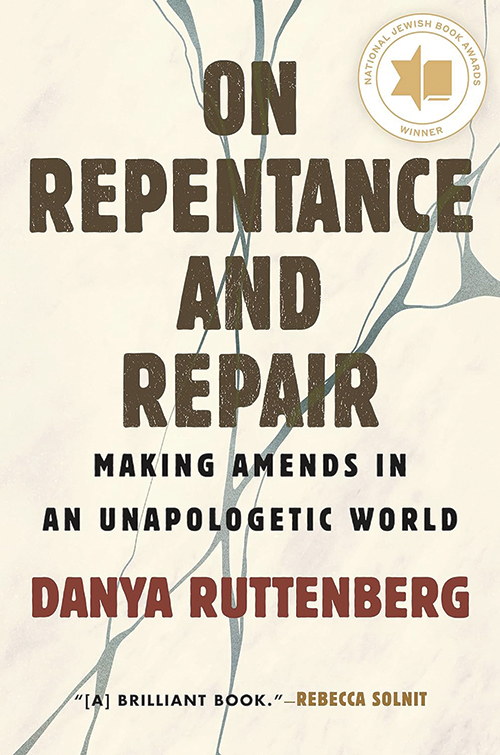
On Repentance and Repair: Making Amends in an Unapologetic World
Reviewed by Lauren Brownlee
November 1, 2023
By Danya Ruttenberg. Beacon Press, 2022. 256 pages. $25.95/hardcover; $18/paperback; $13.99/eBook.
In On Repentance and Repair: Making Amends in an Unapologetic World, Rabbi Danya Ruttenberg shares how wisdom from ancient Jewish texts concerning repentance and repair remains not only relevant but important in today’s world. She grounds the text in the writings of medieval philosopher Maimonides, particularly his model for repair, which included naming and owning harm, working toward personal transformation, restitution and accepting consequences, apology, and making different choices the next time one is presented with a similar situation. Ruttenberg leads readers through a journey of reflecting on how to apply Maimonides’s principles to personal relationships, public harm, institutional harm, national harm, justice systems, forgiveness, and atonement. Ruttenberg makes it clear how important these principles are for both the United States and our global community.
As someone who has spent a lot of time and energy reflecting on restoration in a range of Quaker contexts in recent years, I believe this book has much to offer to Friends. To me the book mirrors the guidance laid out in the “Racial Wounding and Racial Justice in Quaker Communities” document developed by the Quaker Coalition for Uprooting Racism, of which I am a member. Both emphasize the key values and behaviors that help facilitate true reconciliation, such as not privileging intent over impact, facing harm head on (doing so publicly when the harm is public), committing to learn from our mistakes, centering the needs of those who have been harmed, and remaining cognizant of the impact of power dynamics on both harm and repair.
Ruttenberg’s words can inspire us to be our best selves. Some of my favorite quotes include “facing the harm that I caused is an act of profound optimism. It is a choice to grow, to learn, to become someone who is more open and empathetic,” and “sometimes we—the concerned third parties in community with those harming and harmed—can also offer enough love to help others grow from mistakes.” Quaker testimonies call us to this work of healing, restoration, and transformation.
The lessons Ruttenberg shares are universally useful. She writes:
We’ve all caused harm, we’ve all been harmed, we’ve all witnessed harm. We are all always growing in our messy, imperfect attempts to do right, to clean up, to repair, to make sense of what’s happened, and to figure out where to go from here.
Harm may be universal, but the ways we respond to it are not. Rather than focusing on never harming others in our community (a goal that can represent perfectionism), Ruttenberg suggests that we focus on caring for each other enough to focus on repair whenever it is needed. She quotes activist Mariame Kaba commenting on her experience facilitating a community accountability process for sexual harm: “None of us can be bystanders. . . . This is a collective responsibility.” The book makes the argument that repair work benefits not only individuals who have harmed or experienced harm, but all of us. May we love ourselves and each other through the growing pains of becoming a beloved community.
“The measure of who you are as a person is not whether or not you screw up, because we all screw up. The measure of who you are as a person is what happens next, and how well you take responsibility.” Rabbi Ruttenberg’s interview with Friends Journal.
Lauren Brownlee is a member of Bethesda (Md.) Meeting, serves as the associate general secretary for community and culture at Friends Committee on National Legislation, and serves on the Steering Committee for the Quaker Coalition for Uprooting Racism.
2 thoughts on “On Repentance and Repair: Making Amends in an Unapologetic World”
Leave a Reply
Comments on Friendsjournal.org may be used in the Forum of the print magazine and may be edited for length and clarity.



Thank you for this in-depth review of Danya Ruttenberg’s book On Repentence and Repair. The Jewish and Quaker worlds share this emphasis on the work of healing, restoration, and transformation. I appreciate your lifting up this interfaith work.
Requiring everyone to participate in repentance does not always work. One side may feel it is justified, or does not even realize any harm was caused. Unconditional forgiveness is much more challenging, but far more powerful, and should be modeled by an ideal God.